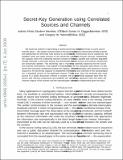Secret-Key Generation Using Correlated Sources and Channels
Author(s)
Khisti, Ashish; Diggavi, Suhas N.; Wornell, Gregory W.
DownloadWornell_Secret-key generation.pdf (303.0Kb)
OPEN_ACCESS_POLICY
Open Access Policy
Creative Commons Attribution-Noncommercial-Share Alike
Terms of use
Metadata
Show full item recordAbstract
We study the secret-key capacity in a joint source-channel coding setup-the terminals are connected over a discrete memoryless channel and have access to side information, modelled as a pair of discrete memoryless source sequences. As our main result, we establish the upper and lower bounds on the secret-key capacity. In the lower bound expression, the equivocation terms of the source and channel components are functionally additive even though the coding scheme generates a single secret-key by jointly taking into account the source and channel equivocations. Our bounds coincide, thus establishing the capacity, when the underlying wiretap channel can be decomposed into a set of independent, parallel, and reversely degraded channels. For the case of parallel Gaussian channels and jointly Gaussian sources we show that Gaussian codebooks achieve the secret-key capacity. In addition, when the eavesdropper also observes a correlated side information sequence, we establish the secret-key capacity when both the source and channel of the eavesdropper are a degraded version of the legitimate receiver. We finally also treat the case when a public discussion channel is available, propose a separation based coding scheme, and establish its optimality when the channel output symbols of the legitimate receiver and eavesdropper are conditionally independent given the input.
Date issued
2012-02Department
Massachusetts Institute of Technology. Department of Electrical Engineering and Computer ScienceJournal
IEEE Transactions on Information Theory
Publisher
Institute of Electrical and Electronics Engineers (IEEE)
Citation
Khisti, Ashish, Suhas N. Diggavi, and Gregory W. Wornell. “Secret-Key Generation Using Correlated Sources and Channels.” IEEE Trans. Inform. Theory 58, no. 2 (February 2012): 652–670.
Version: Original manuscript
ISSN
0018-9448
1557-9654